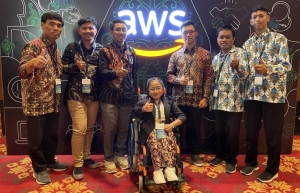How to make sure AI does not leave ASEAN behind
The guidelines set out in Singapore establish a framework for businesses seeking to design, develop, and deploy AI. They give Southeast Asia’s businesses a clear baseline in terms of the characteristics they should prioritise in designing AI, such as explainability, fairness, robustness, and accountability.
 |
There is good reasoning behind this. A recent study by management consulting firm Kearney estimates that AI adoption in ASEAN may add around $1 trillion in value to regional GDP in just five years. This adds up to a massive economic opportunity for small and large companies across the region–but it is an opportunity, not a guarantee.
As it stands, however, many of the tools used to build and control AI may be developed with limited input from users and representatives from Southeast Asia. Until recently, there was no clear consensus on a set of standards and practices for AI development here.
What this means is that the diversity of this region may not be considered in AI design, which can have serious consequences on issues like AI bias, transparency, governance, and safety–while the usability and interoperability of AI systems designed by local businesses and individuals is also potentially limited.
AI development in ASEAN needs to take Southeast Asia’s cultural distinctiveness into account. It is widely known that existing Large Language Models (LLMs)–which are the core building blocks of Generative AI systems–demonstrate biases in terms of cultural values, political beliefs, and social attitudes when they are built using data drawn mostly from English-speaking users.
It may not be surprising that the ten member-nations which make up ASEAN are grossly underrepresented in these existing popular LLMs. To illustrate this, consider the term 'LOL', or 'laugh out loud', which is so widely used that it may come as a shock to some that most non-anglophone countries across ASEAN use entirely different terms.
In Thailand, they use '5555' because the number five is pronounced ‘ha’ in Thai, while Indonesians use 'wkwkwk', with ‘wk’ representing 'gue ketawa'–or 'I laugh' in Bahasa Indonesia. Losing out on these unique cultural and linguistic markers means that AI built on popular LLMs may simply not be relevant in this region.
In response to this, AI Singapore, a national initiative launched by the Singaporean government, has recently introduced the Southeast Asian Languages In One Network (SEA-LION) LLM family, which is specifically tuned for Southeast Asian languages and cultural indicators.
Part of SEA-LION’s tuning includes the use of purpose-built methods aimed at enabling AI systems to comprehend and process text in Bahasa Indonesia, Bahasa Melayu, Thai, and Vietnamese. SEA-LION will also be expanded to process other languages, such as Burmese and Lao.
By using more inclusively designed LLMs like SEA-LION, AI systems can be trained on data that better reflects Southeast Asia, leading to AI software that can better service the needs of users and companies across the area.
The guidelines adopted at ADGMIN are also significant for governments, as they set the tone for national-level regulations governing AI, encouraging the adoption of risk-based approaches that allow regulators to effectively address gaps in existing frameworks, and promote responsible AI development.
All in all, ASEAN’s adoption of these guidelines is an important step towards introducing a coherent set of standards and practices for AI across the region. Using these guidelines, companies in every ASEAN member-nation can focus their efforts on the right checks and balances for the AI systems they seek to develop, knowing that these are the same priorities endorsed ASEAN-wide.
This reinforces ASEAN’s position as a proactive driver of growth for the region’s burgeoning AI industry, broadening the market for AI businesses in any member economy by allowing them to access opportunities under the same terms they might find at home.
Furthermore, as part of ASEAN’s effort to ensure that the guidelines were as holistic as possible, it consulted the private sector, including AWS, for input. We were proud to have been able to contribute our views and endorse this important document.
As 2024 unfolds, another development we can look forward to in ASEAN is the much-anticipated Digital Economy Framework Agreement (DEFA).
Aside from ensuring AI systems take ASEAN’s cultural and linguistic uniqueness into account and adhere to common standards of governance, governments across the region must ensure that AI remains accessible to as much of the population as possible.
Through Digital Trade Agreements like DEFA, ASEAN should aim to promote inclusive and broader adoption of AI, and enable access to the right tools and data to effectively use AI.
DEFA has the potential to do this by securing commitments on cross-border data flows that allow businesses in ASEAN to access the same high-quality AI tools as elsewhere in the world – so a developer in Hanoi should have access to the same AI tools as a developer in San Francisco. Adopting international standards to ensure AI use cases developed here can be used anywhere else will also be important.
It is clear that 2024 will be a pivotal year for AI in the region. With the strides that have already been made to date, however, we can be confident that strong foundations are being laid for Southeast Asia to move boldly into an AI-powered future.
 | AWS is helping Asia-Pacific get 'AI-ready' We hear from Andrew Sklar, director of Training and Certification at Amazon Web Services for Asia Pacific and Japan, about the tech giant's new training initiatives that are helping businesses and individuals in the region prepare for the next big evolutionary step in technology. |
 | AWS re:Invent 2023 showcased future of AI AWS re:Invent 2023 made a big impression with some groundbreaking announcements, thought-provoking keynote speeches, and immersive experiences to help businesses plan the future of their cloud transformation journey. |
 | AI Singapore brings inclusive generative AI models to Southeast Asia Anticipating the importance of inclusive Generative AI models, AI Singapore is collaborating with Amazon Web Services (AWS) to produce the region's first Large Language Model family trained for Southeast Asian languages and cultures. |
What the stars mean:
★ Poor ★ ★ Promising ★★★ Good ★★★★ Very good ★★★★★ Exceptional
Themes: Digital Transformation
- Dassault Systèmes and Nvidia to build platform powering virtual twins
- Sci-tech sector sees January revenue growth of 23 per cent
- Advanced semiconductor testing and packaging plant to become operational in 2027
- BIM and ISO 19650 seen as key to improving project efficiency
- Viettel starts construction of semiconductor chip production plant
Related Contents
Latest News
More News
- Dassault Systèmes and Nvidia to build platform powering virtual twins (February 04, 2026 | 08:00)
- Young entrepreneurs community to accelerate admin reform (February 03, 2026 | 13:04)
- Spring Fair 2026 launches national fair series (January 30, 2026 | 16:17)
- SnP celebrates 10th anniversary with new brand identity (January 30, 2026 | 14:41)
- Sci-tech sector sees January revenue growth of 23 per cent (January 30, 2026 | 11:20)
- Vietnam–Singapore partnership strengthens board leadership (January 30, 2026 | 11:02)
- DIGI-TEXX expands footprint with new hub in Ho Chi Minh City (January 30, 2026 | 09:04)
- Vietnamese spend $2.1 billion on food delivery apps in 2025 (January 29, 2026 | 15:14)
- Japan's NTT DATA signs agreement with CMC Global (January 29, 2026 | 15:03)
- Japfa Vietnam hosts annual customer conference (January 29, 2026 | 12:07)

 Tag:
Tag:
























 Mobile Version
Mobile Version